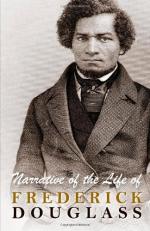|
This section contains 7,361 words (approx. 25 pages at 300 words per page) |

|
SOURCE: Gates, Henry-Louis, Jr. “Binary Oppositions in Chapter One of Narrative of the Life of Frederick Douglass an American Slave Written by Himself.” In Afro-American Literature: The Reconstruction of Instruction, edited by Dexter Fisher and Robert B. Stepto, pp. 212-32. New York: Modern Language Association of America, 1979.
In the following essay, Gates discusses the way in which Douglass's narrative participated in contemporary literary conventions by setting up such binary oppositions as black/white, slave/free, ignorance/knowledge, and nature/culture.
I was not hunting for my liberty, but also hunting for my name.
—William Wells Brown, 1849
Whatever may be the ill or favored condition of the slave in the matter of mere personal treatment, it is the chattel relation that robs him of his manhood.
—James Pennington, 1849
When at last in a race a new principle appears, an idea,—that conserves it; ideas only save races. If the...
|
This section contains 7,361 words (approx. 25 pages at 300 words per page) |

|


